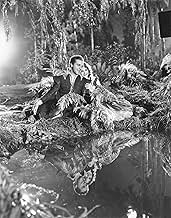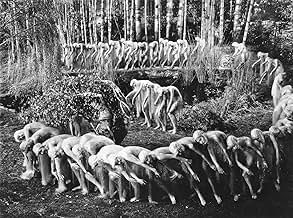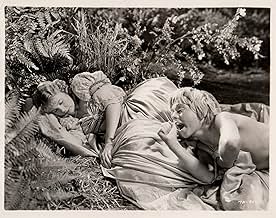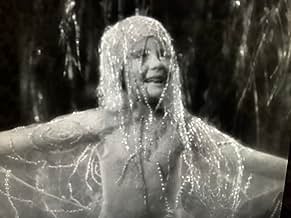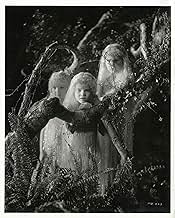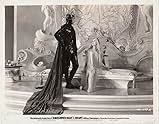AVALIAÇÃO DA IMDb
6,8/10
4,1 mil
SUA AVALIAÇÃO
Adicionar um enredo no seu idiomaTwo couples and a troupe of actors have an encounter with some mischievous fairies in the forest.Two couples and a troupe of actors have an encounter with some mischievous fairies in the forest.Two couples and a troupe of actors have an encounter with some mischievous fairies in the forest.
- Direção
- Roteiristas
- Artistas
- Ganhou 2 Oscars
- 6 vitórias e 2 indicações no total
Olivia de Havilland
- Hermia - In Love with Lysander
- (as Olivia de Haviland)
Nini Theilade
- Fairie - Attending Titania
- (as Nina Theilade)
- Direção
- Roteiristas
- Elenco e equipe completos
- Produção, bilheteria e muito mais no IMDbPro
Avaliações em destaque
The movie is dated, true. In fact, seeing 30's Hollywood's version of Shakespearian England's version of Athenian costuming is a delight in itself. But the actors in this rendition are just amazing. Not only is the cast impressive (Cagney, Brown, Rooney, D'Havilland, Powell), but they are doing the roles with the right mixture of buffoonery and dedication to Shakespeare's love of high and low comedy together.
The casting of Cagney as Bottom was brilliant, his mixture of swagger and obliviousness is perfect, especially when played off of the great Joe E. Brown, who's rubber faced quiet performance is uproarious. Young Mickey Rooney is a wonderful puck, light and athletic, it may be his finest work. The special effects manage to give off the feeling of faerie, without overpowering what is going on. And the weaving of the two stories together works as well as might be hoped for.
I consider this to be the classic definitive Midsummer's Night Dream films. No other can ever measure up.
The casting of Cagney as Bottom was brilliant, his mixture of swagger and obliviousness is perfect, especially when played off of the great Joe E. Brown, who's rubber faced quiet performance is uproarious. Young Mickey Rooney is a wonderful puck, light and athletic, it may be his finest work. The special effects manage to give off the feeling of faerie, without overpowering what is going on. And the weaving of the two stories together works as well as might be hoped for.
I consider this to be the classic definitive Midsummer's Night Dream films. No other can ever measure up.
I came across this movie one rainy afternoon on TV. Jimmy Cagney doing Shakespeare? Surely not! My expectations were, frankly, low. We English are a bit funny about Shakespeare, as you can imagine, and the thought of the dirty rat as one of the bard's greatest comic creations was worrying, to say the least. The whole film is, however, magical. I laughed out loud at the wall joke, even though I knew what was coming, and Roony's Puck was, as another contributor says, probably his best performance. Bottom's realisation that he is now the proud possessor of an ass's head is quite affecting. It's Titania's fairies, though, that make this such a wonderful experience. I have seen this a couple of times since that rainy afternoon, and am always convinced that it will not live up to my expectations. It always does, though. The sheer beauty of the scene where the fairies awake is, as we say over here, gob-smacking. I am sure that this could never be done with such picturesque quality in colour. I had this on tape for a long time, and then I lent it to some eejit who erased it. I scan the listings every week to see if it's on TV, and when it is I shall make sure that it never leaves my possession.
Pre-1950 film adaptations of Shakespeare's plays have varied in quality. Some were good and more, especially Laurence Olivier's brilliant 1948 adaptation of 'Hamlet', though that is something to see on its own terms. Others were average or less, with one example being the 1936 film of 'As You Like It', which was very static and stagy and had a badly miscast Rosalind. Had little doubt that this film would be at least above average, considering that the play is one of Shakespeare's best and because the cast is so good.
1935's 'A Midsummer Night's Dream' is a dream. To me it is not just the best screen/film adaptation of 'A Midsummer Night's Dream' (bar none), it is also one of the best film versions of any Shakespeare play pre-1950 and perhaps overall. As well as one of the best adaptations of 'A Midsummer Night's Dream' full stop, for me only the National Theatre Live and Julie Taymor productions are better though once again as standalones. It has very few if any of the things that other early Shakespeare film adaptations did and is full of magic and entertainment value. It's not perfect, but there is so much to adore here.
For one thing, the photography is exquisite and the settings and such are very lavish and rustic. The world one is immersed in being truly fantastical. Also loved the use of Mendelssohn's music, the music itself some of his best loved for good reason (and he was only 16 when he wrote it!) and it is used cleverly and tastefully. Korngold's, one of my favourite film composers, contribution is typically lush and rousing without being over-scored.
The dancing is beautifully choreographed and danced with great grace and elegance, as well as shot and edited in an appropriately dream-like way. The writing is still incredibly funny, without trying too hard, and also beautifully poetic. The story is incredibly charming and told with great spirit, doing nothing to confuse a story that is already quite complicated. The action is opened up enough to not betray stage origins and the atmosphere is suitably magical. The direction is beautifully theatrical, Reinhardt's theatre roots are evident without hurting the drama. The comedy hits the mark, especially with Bottom.
Most of the performances are great, with two exceptions. James Cagney is a sheer delight as Bottom in a role that is so different to what he was usually cast as and shows that he did have a light and funny side to him. Mickey Rooney's performance has left people more mixed, count me in as one of the people that loved his Puck and consider it one of his better performances. The mischievous energy he embodies is infectious. Olivia De Havilland is a charming Hermia and Victor Jory a sinister, amusing and textbook Oberon. Anita Louise's Titania is spirited and regal and Ian Hunter and Joe E. Brown are very good.
Only two performances don't come over as well. One is Dick Powell, who is very bland and too earnest. The other is the very irritating Hugh Herbert, who was always an acquired taste and was very take and leave for me.
Also found the finale on the overblown side.
Concluding however, great. 9/10.
1935's 'A Midsummer Night's Dream' is a dream. To me it is not just the best screen/film adaptation of 'A Midsummer Night's Dream' (bar none), it is also one of the best film versions of any Shakespeare play pre-1950 and perhaps overall. As well as one of the best adaptations of 'A Midsummer Night's Dream' full stop, for me only the National Theatre Live and Julie Taymor productions are better though once again as standalones. It has very few if any of the things that other early Shakespeare film adaptations did and is full of magic and entertainment value. It's not perfect, but there is so much to adore here.
For one thing, the photography is exquisite and the settings and such are very lavish and rustic. The world one is immersed in being truly fantastical. Also loved the use of Mendelssohn's music, the music itself some of his best loved for good reason (and he was only 16 when he wrote it!) and it is used cleverly and tastefully. Korngold's, one of my favourite film composers, contribution is typically lush and rousing without being over-scored.
The dancing is beautifully choreographed and danced with great grace and elegance, as well as shot and edited in an appropriately dream-like way. The writing is still incredibly funny, without trying too hard, and also beautifully poetic. The story is incredibly charming and told with great spirit, doing nothing to confuse a story that is already quite complicated. The action is opened up enough to not betray stage origins and the atmosphere is suitably magical. The direction is beautifully theatrical, Reinhardt's theatre roots are evident without hurting the drama. The comedy hits the mark, especially with Bottom.
Most of the performances are great, with two exceptions. James Cagney is a sheer delight as Bottom in a role that is so different to what he was usually cast as and shows that he did have a light and funny side to him. Mickey Rooney's performance has left people more mixed, count me in as one of the people that loved his Puck and consider it one of his better performances. The mischievous energy he embodies is infectious. Olivia De Havilland is a charming Hermia and Victor Jory a sinister, amusing and textbook Oberon. Anita Louise's Titania is spirited and regal and Ian Hunter and Joe E. Brown are very good.
Only two performances don't come over as well. One is Dick Powell, who is very bland and too earnest. The other is the very irritating Hugh Herbert, who was always an acquired taste and was very take and leave for me.
Also found the finale on the overblown side.
Concluding however, great. 9/10.
A Midsummer Night's Dream was to be Jack Warner's bow to culture back during the Depression. The economical studio which specialized in urban dramas was doing something that normally MGM would have taken the lead in. In fact I'm not so sure that Louis B. Mayer decided that if Warner Brothers could make Shakespeare popular, he could do it better and hence Norma Shearer got to star in Romeo and Juliet.
The great German Impresario producer Max Reinhardt with co-direction from another German emigrant, William Dieterle, put this together. He played to Warner Brothers other strength, those Busby Berkeley musicals and their intricate numbers. Visually, A Midsummer Night's Dream is stunning with an ethereal quality as the various faeries and nymphs go through the woods. They do their thing to Mendelsohn's great music as arranged by Erich Wolfgang Korngold. In fact this was the start of Korngold's relationship with the brothers Warner and some of the great musical scores he wrote for them.
This was also the start of Olivia DeHavilland's great career. Olivia is one of the few major stars who literally went from unknown to star in one fell swoop. She had graduated high school and was doing some summer stock before entering college when Max Reinhardt spotted here while touring America with A Midsummer Night's Dream. When Warner Brothers got his services for this film, he brought with him Olivia and personally cast her as Hermia.
The film was held up with editing, scoring, retakes, and Olivia made and was seen in two low budget films before A Midsummer Night's Dream was released. So her debut is in a Joe E. Brown film, Alibi Ike. But this is her first film.
The material was familiar to Olivia, but not all her fellow players at Warner Brothers were so blessed. Dick Powell said that this film was one of the two worst experiences he had while at that studio. He had no training of any kind to do this classical piece and said he was lost through out the whole production.
James Cagney is no classical actor either, but as Bottom with or without the donkey's head on him, courtesy of Puck, Cagney brings his boisterous style to the proceedings and it works for the most part. Some of the other tradespeople in the town Frank McHugh, Dewey Robinson and Joe E. Brown look pretty lost though.
On loan out from MGM, Mickey Rooney steals the show as Puck. On orders from Victor Jory the Faerie King to play a little joke on his wife Anita Louise, Rooney casts a spell on her that will make her fall for the first living soul she sees. Rooney decides on is own to sweeten the joke by giving James Cagney a donkey's head and making sure that Louise sees him first. And of course the four lovers, Dick Powell, Ross Alexander, Jean Muir, and Olivia DeHavilland, Rooney confuses their affections as well as a bonus.
Rooney who was another kid actor up to this point, got his first real critical notices in this. It led to his becoming a major star over at MGM and Louis B. Mayer never lending him out to anyone again as long as he was under contract there.
A Midsummer Night's Dream is a curious film. Shakespearean purists might recoil at some of the casting, but I'm sure it was entertaining enough for the Depression audiences.
The great German Impresario producer Max Reinhardt with co-direction from another German emigrant, William Dieterle, put this together. He played to Warner Brothers other strength, those Busby Berkeley musicals and their intricate numbers. Visually, A Midsummer Night's Dream is stunning with an ethereal quality as the various faeries and nymphs go through the woods. They do their thing to Mendelsohn's great music as arranged by Erich Wolfgang Korngold. In fact this was the start of Korngold's relationship with the brothers Warner and some of the great musical scores he wrote for them.
This was also the start of Olivia DeHavilland's great career. Olivia is one of the few major stars who literally went from unknown to star in one fell swoop. She had graduated high school and was doing some summer stock before entering college when Max Reinhardt spotted here while touring America with A Midsummer Night's Dream. When Warner Brothers got his services for this film, he brought with him Olivia and personally cast her as Hermia.
The film was held up with editing, scoring, retakes, and Olivia made and was seen in two low budget films before A Midsummer Night's Dream was released. So her debut is in a Joe E. Brown film, Alibi Ike. But this is her first film.
The material was familiar to Olivia, but not all her fellow players at Warner Brothers were so blessed. Dick Powell said that this film was one of the two worst experiences he had while at that studio. He had no training of any kind to do this classical piece and said he was lost through out the whole production.
James Cagney is no classical actor either, but as Bottom with or without the donkey's head on him, courtesy of Puck, Cagney brings his boisterous style to the proceedings and it works for the most part. Some of the other tradespeople in the town Frank McHugh, Dewey Robinson and Joe E. Brown look pretty lost though.
On loan out from MGM, Mickey Rooney steals the show as Puck. On orders from Victor Jory the Faerie King to play a little joke on his wife Anita Louise, Rooney casts a spell on her that will make her fall for the first living soul she sees. Rooney decides on is own to sweeten the joke by giving James Cagney a donkey's head and making sure that Louise sees him first. And of course the four lovers, Dick Powell, Ross Alexander, Jean Muir, and Olivia DeHavilland, Rooney confuses their affections as well as a bonus.
Rooney who was another kid actor up to this point, got his first real critical notices in this. It led to his becoming a major star over at MGM and Louis B. Mayer never lending him out to anyone again as long as he was under contract there.
A Midsummer Night's Dream is a curious film. Shakespearean purists might recoil at some of the casting, but I'm sure it was entertaining enough for the Depression audiences.
While the 1999 version is receiving mixed reviews, this classic version with a star-studded cast is delightfully mischievous. Mickey Rooney, a very young boy, has never been better cast, nor delivered a better performance. And despite the dream sequences not always being clearly distinguished from real time motion, one catches on quickly enough. Everyone, even Dick Powell, delivers his lines mellifluously, something that cannot be said for the 1999 version. There's more energy and zeal, more mystery and charm, more color(though B&W) and clarity, despite its age. Remarkable performances under exellent direction work together to make the Bard sparkle, and the film enchant.
Você sabia?
- CuriosidadesWhen the forest that Max Reinhardt designed could not be lit properly, cinematographer Hal Mohr thinned the trees slightly, sprayed them with aluminum paint and covered them with cobwebs and tiny metal particles to reflect the light. As a result, he became the first (and only) write-in winner of an Academy Award.
- Erros de gravaçãoCorrective lenses were introduced in the 13th century so they could have been worn in Shakespeare's time.
- Citações
Hermia, in Love with Lysander: [to Helena] How low am I, you painted maypole? Speak! How low am I? I am not yet so low but that my nails can reach into your eyes!
- Cenas durante ou pós-créditosThe opening credits appear as if they were "trickling down" from the top of the screen.
- Versões alternativasThe original 132-minute roadshow version of this film has been restored, shown on cable, and issued on videocassette and DVD. For many years, though, this film was shown only in its general release version, a 117-minute version painstakingly edited by the studio (so that the cuts would not be noticeable), which shifted the order of some sequences and eliminated others.The 2007 DVD release also restores the Intermission title card, not seen since the film's original roadshow release in 1935, as well as including the overture and exit music.
- ConexõesFeatured in A Dream Comes True (1935)
- Trilhas sonorasA Midsummer Night's Dream: Overture and Incidental Music
(1826) (uncredited)
Music by Felix Mendelssohn
Adapted by Erich Wolfgang Korngold
Heard throughout the film
Principais escolhas
Faça login para avaliar e ver a lista de recomendações personalizadas
- How long is A Midsummer Night's Dream?Fornecido pela Alexa
Detalhes
- Data de lançamento
- País de origem
- Central de atendimento oficial
- Idioma
- Também conhecido como
- A Midsummer Night's Dream
- Locações de filme
- Empresas de produção
- Consulte mais créditos da empresa na IMDbPro
Bilheteria
- Faturamento bruto mundial
- US$ 2.616.000
- Tempo de duração2 horas 13 minutos
- Cor
- Mixagem de som
- Proporção
- 1.37 : 1
Contribua para esta página
Sugerir uma alteração ou adicionar conteúdo ausente

Principal brecha
By what name was Sonho de uma Noite de Verão (1935) officially released in India in English?
Responda

